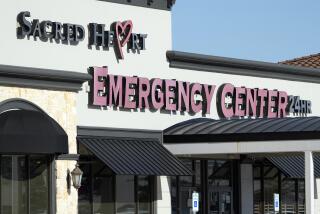Reactions Strong and Divided
- Share via
Religious organizations condemned the ruling; civil libertarians applauded it. The American Medical Assn. attacked it; individual doctors supported it. Bioethicists were split.
But from all directions, the reactions to the federal appeals court decision approving physician-assisted suicide were swift and emotional. The one thing everyone agreed on was the decision’s enormous import.
“Hallelujah,” proclaimed Kelly Scott, public policy director of the Northwest AIDS Foundation in Seattle, which filed a friend-of-the-court brief in the case. “I’m not sure if this will lead to more physician-assisted suicides by those with AIDS. But for those who are facing death with AIDS, or even having to think about it, court recognition of their private right to die with dignity will give them a lot of peace.”
“I’m appalled,” reacted Sara DiVito Hardman of Tarzana, state director of the Christian Coalition. “Has human life such little value? Where is this going to lead now? Scripture does not make allowance either for killing the unborn or for euthanasia.”
Burke Balch, director of the National Right to Life Committee’s Department of Medical Ethics, predicted dire consequences. “No one should think that this ruling can be applied only to those who ‘voluntarily’ say they seek death,” he said, forecasting that guardians or trustees will have the power to authorize the deaths of persons declared mentally incompetent.
“Exercising a right to die is not like choosing Pepsi over Coke,” said Joni Eareckson Tada, the wheelchair-using leader of JAF Ministries in Agoura Hills and a popular speaker in evangelical Protestant circles.
“The end-of-life issues are so complex, so subjective and hugely arbitrary that is impossible to frame such freedoms within legislation. It would allow too many wrong decisions by too many people,” she said, predicting that the U.S. Supreme Court will have similar doubts.
Patrick Nichelson, professor of religious studies at Cal State Northridge, praised the decision, however, citing personal experiences “with family and friends who had death struggles, prolonged by medicine.”
“What we are trying to do in society is find an open way to talk about and legitimate humane practices [of assisting death] that have been underway for ages between doctors and patients,” Nichelson said.
Dr. Thomas A. Preston, a Seattle cardiologist and a plaintiff in the case, also applauded the decision, saying the ‘slippery-slope’ arguments being advanced by opponents of physician-assisted suicide parallel those made 15 years ago “when doctors started to withdraw ventilators from patients who requested it. The fact is that nobody really has charged that the medical profession has abused this practice since we have been allowed to do it.”
Nonetheless, the American Medical Assn., which has long opposed physician-assisted suicide, lamented the ruling: “We would stand by our stance that it would be unethical for a physician to participate in an assisted suicide, which would be the active killing of a patient.”
Dr. Bob Leibowitz, a Tarzana-based cancer specialist, expressed fears that the decision opens a window that some families may try to force even wider.
“If you don’t have safeguards, then you’re going to have euthanasia that is not in the patient’s best interest,” he said. “Family members who want to obtain an estate quickly can be very persuasive at telling a mother or father that they should die sooner than they really have to.”
Leibowitz also said he feared that health-maintenance organizations, finding it cheaper to let people die who could lead full lives for years on expensive medication, “will be pressuring doctors to recommend to patients that no care is the best care.”
The response in the religious community was particularly strong, even though the 9th Circuit decision specifically said that it was not granting broad license for euthanasia, also called mercy killing.
The Catholic Church has long opposed euthanasia, branding it “a grave violation of the law of God” in a 1995 Papal Encyclical.
Mark Chopko, general counsel of the U.S. Catholic Conference, called the ruling “a novel and dangerous expansion of the law” that obliterates “a distinction that has long been recognized--not just in the law but in medicine--” between withdrawing medical assistance and taking active steps to hasten death.
Similar opposition came from a spokesman for the 5.2-million-member Evangelical Lutheran Church in America and Rabbi Lawrence Goldmark, incoming president of the Board of Rabbis of Southern California.
While religious leaders are overwhelmingly opposed to assisted suicide, opinion is by no means unanimous. In January, the Episcopal Diocese of Newark led by liberal Bishop John Spong declared that committing suicide or helping someone else commit suicide may be morally acceptable for Christians in some circumstances. But that is not the position of the national Episcopal Church.
Arthur Caplan, director of the University of Pennsylvania’s Center for Bioethics, observed that “a courtroom is a terrible place to resolve deeply divisive social issues such as assisted suicide. If we’ve learned anything from the national agony over abortion, it is that tough, contentious questions of morality need to be settled at the ballot box, not by a judge or a panel of judges.”
In Sacramento, Assemblywoman Kerry Mazzoni (D-Novato), who authored a bill last year to legalize assisted suicide, said she was encouraged by the court’s decision. But she said the issue remains so controversial among legislators that the best approach to put an assisted-suicide law on the books is through a ballot initiative. Four years ago, California voters rejected such a measure by a 54%-46% margin.
Times staff writers Larry B. Stammer and Jon D. Markman contributed to this story.
More to Read
Sign up for Essential California
The most important California stories and recommendations in your inbox every morning.
You may occasionally receive promotional content from the Los Angeles Times.













